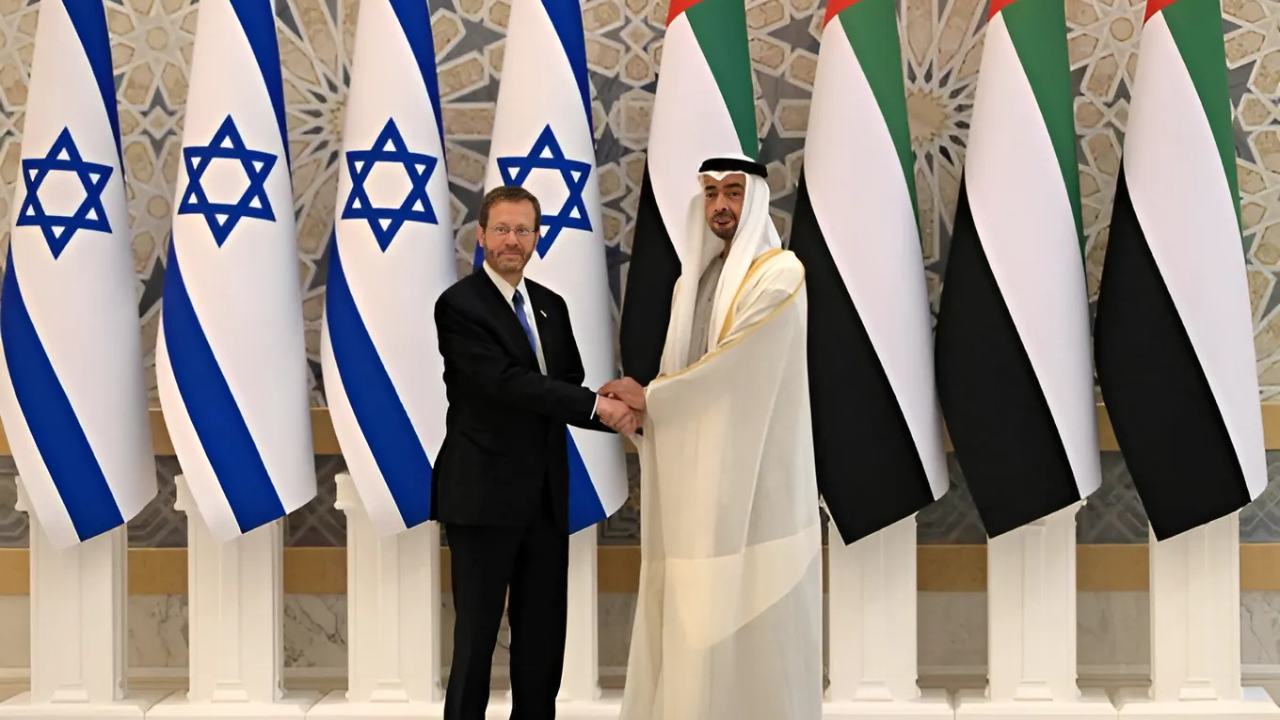
Post by : Naveen Mittal
The United Arab Emirates (UAE) has summoned Israel’s ambassador to express its anger over a recent attack in Qatar. This move shows that relations between the two countries are becoming tense again, even though they have strong trade and defence connections.
On Tuesday, Israel carried out a military attack in Qatar’s capital, Doha. The strike was aimed at Hamas leaders, who are part of a group that controls Gaza. Many countries around the world condemned the attack because it could worsen the situation in the Middle East.
Following this attack, the UAE, which has had good relations with Israel, took a serious step and called the Israeli ambassador to explain its concerns. This shows that even strong partnerships can face challenges when political and military actions create disagreements.
Even before the attack, there were tensions between the two countries. The UAE had concerns over Israel’s plans to take control of parts of the West Bank, a disputed area between Israel and Palestine. The UAE warned that this would cross a “red line” and cause serious problems.
Israel’s Prime Minister, Benjamin Netanyahu, made harsh statements after the attack. He warned Qatar to either expel Hamas leaders or face consequences, saying,
“If you don’t, we will bring them to justice.”
The UAE strongly condemned these remarks and called them “hostile.” Sheikh Mohammed bin Zayed al-Nahyan, the President of the UAE, visited other Gulf countries to coordinate their response to Israel’s attack.
Qatar has been working hard to help bring peace between Israel and Hamas. It has hosted talks to arrange a ceasefire and help release hostages. Because of this role, attacking political leaders in Qatar is seen as a serious and dangerous action.
Doha will host an emergency summit with other Arab and Islamic countries to discuss how to respond to the attack. Leaders will meet this Sunday and Monday to find a united way to deal with the crisis.
The conflict began on October 7, 2023, when Hamas attacked Israel. Over 1,200 people were killed, mostly civilians, and about 251 were taken hostage. Israel responded with military action that has killed more than 64,000 people, according to Gaza’s health authorities.
This war has caused widespread destruction, suffering, and displacement. Many families have lost their homes and loved ones, and the situation remains dangerous.
The UAE became the first Arab country in decades to normalize relations with Israel. In 2020, under the Abraham Accords, the two countries signed an agreement with the help of the United States.
This agreement led to stronger trade, security cooperation, and defence ties. The UAE, being a major oil producer and a key trading hub in the Middle East, has significant influence in the region.
However, despite these agreements, political disagreements and military actions, like the attack in Qatar, can strain relationships and make peace harder to maintain.
The attack in Qatar and the UAE’s reaction show how delicate peace agreements can be. Even when countries cooperate, new conflicts can create divisions.
Experts believe that the war between Israel and Hamas is spreading beyond Gaza, affecting other countries like Lebanon, Syria, and Iran. The region’s stability depends on careful diplomacy and cooperation.
The UAE’s decision to call the Israeli ambassador shows that it is willing to stand up against actions it believes threaten peace, even if it risks damaging a partnership.
Countries around the world are watching closely. Many are calling for calm and peaceful negotiations to prevent further violence.
International organizations like the United Nations are urging both sides to work toward protecting civilians and finding a lasting solution.
The emergency summit in Doha could be a chance for leaders to express solidarity and make plans to stop the war before it spreads further.
The UAE’s strong response to Israel’s attack in Qatar shows that peace agreements need constant care and attention. Old friendships can be tested by new conflicts.
While the region faces difficult challenges, there is hope that diplomacy, dialogue, and cooperation can bring a solution. It is a reminder that leaders must prioritize the lives and safety of ordinary people over political gains.
This situation teaches us that peace is not something achieved once—it must be protected through understanding, patience, and the willingness to face difficult issues together.










Curry Powers Warriors to Nail-Biting 109-108 Victory Against Spurs
Stephen Curry's 49 points propel the Warriors to a dramatic 109-108 NBA Cup triumph over the Spurs,

India Advances to Semi-Finals After Thrashing USA in Women’s Blind T20 World Cup
India secured a dominant ten-wicket victory over the USA, advancing to the semi-finals in the Women’

South Africa's Early Advantage as India Struggles on Day Two
On Day Two, India reached 138-4 as South Africa took three early wickets, complicating matters with

Kenta Nishimoto Defeats Lakshya Sen in Japan Masters Semifinal
Lakshya Sen's journey in the Japan Masters ends after losing to Kenta Nishimoto 19-21, 21-14, 12-21

Kenta Nishimoto Defeats Lakshya Sen in Japan Masters Semifinals
Lakshya Sen's run at the Japan Masters concludes with a loss to Kenta Nishimoto in the semifinals, 1

Major IPL Trade: Jadeja Joins Royals as CSK Signs Samson
In a significant IPL trade, CSK has acquired Sanju Samson from Rajasthan Royals in exchange for Ravi